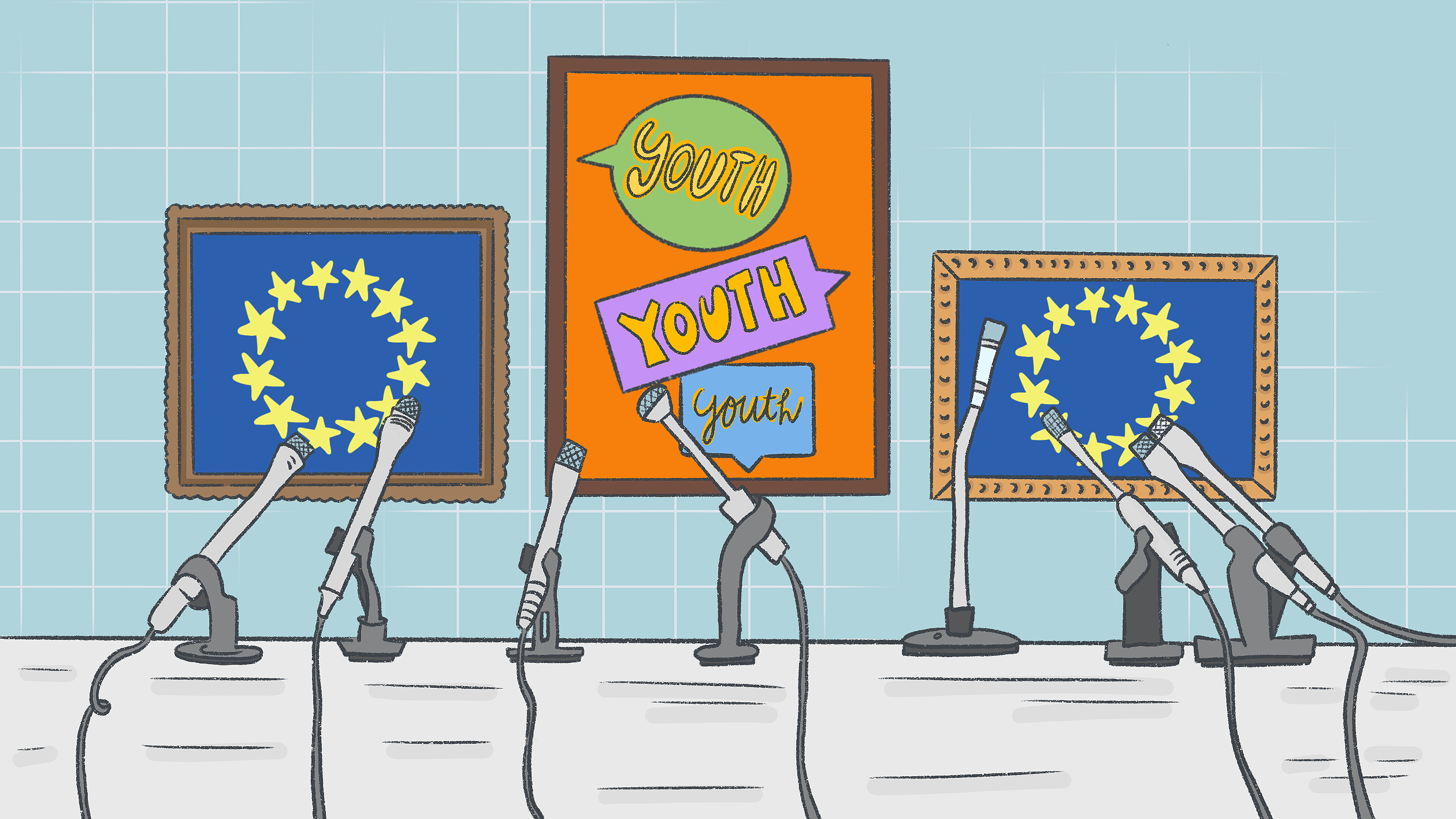
Illustration by Daniela Nunes
The aftermath of the 2024 European elections: a missed opportunity for youth representation
By Fabiana Maraffa
As the 2024 European Elections conclude, it is evident that young people continue to face underrepresentation in European politics. Despite the energy, ideas and tireless campaigning of young people, systemic barriers that have long impeded fair representation persist, limiting the presence of young voices in decision-making spaces. According to the European Youth Forum’s analysis, political parties across Europe did not provide young politicians with meaningful opportunities to secure elected positions.
 Before the elections: the work of youth organisations
Before the elections: the work of youth organisations
In the lead-up to the 2024 European Elections, youth organisations across Europe, including the European Youth Forum and the youth wings of various political parties, made significant efforts to engage young voters and place youth issues at the heart of political discourse. One of the key initiatives was the LevelUP! event, where 1 200 young activists from across Europe gathered at the European Parliament. This event provided an invaluable opportunity for these activists to connect, exchange ideas and strengthen their campaigns, ensuring that their voices would resonate across their home countries as the elections approached.
Another important effort in showcasing the key contribution of young politicians was the Rising stars debate. Unlike typical political debates, this event provided a platform for youth leaders from the youth wings of political parties – those affiliated with the European Youth Forum – to articulate their visions for Europe’s future. The debate focused on crucial topics such as climate change, education and equality, offering an inspiring showcase of the perspectives and ideas that young people bring to the political arena. These activities were instrumental in ensuring that the concerns of young Europeans were not only heard but amplified in the run-up to the elections.
 The number of young MEPs elected is still unfairly low
The number of young MEPs elected is still unfairly low
Despite these efforts, the election results reveal a sobering truth: the representation of young people in the European Parliament remains inadequate. Although young people make up 25% of the European population, they hold only 10% of the seats in the European Parliament. Malta has the youngest delegation with a median age of 40.5, while Luxembourg has the oldest, with a median age of 62, more than a 20-year gap highlights the disconnect between the age of elected representatives and that of the general population, which has a median age of 39.3.
It is particularly striking that the European People’s Party (EPP), the largest group in the European Parliament, has dedicated only 4.8% of its seats to young people. Similarly, the Progressive Alliance of Socialists and Democrats (S&D), the second-largest group, allocated just 9.6% of its seats to young MEPs. These two groups, which together represent about 40% of the European population, have a significant historical presence, wield considerable political influence and maintain strong party structures, giving them substantial authority within the European Parliament and the European decision-making processes. Yet, they also have some of the lowest percentages of young MEPs, comparable only to the far-right Patriots for Europe group.
 Not enough young candidates, not enough chances
Not enough young candidates, not enough chances
The European Youth Forum’s analysis of the electoral lists reveals a troubling trend: candidates under 35 are often relegated to less favourable positions on the lists, where they have less than a 50% chance of securing a seat. Meanwhile, older candidates consistently dominate the top, more electable spots, making it far easier for them to secure seats. The data speaks for itself – there simply weren’t enough young candidates on the ballots, and many political parties failed to prioritise youth representation. Some placed young candidates in “unwinnable positions” at the end of electoral lists, while others excluded them altogether.
Even for those young candidates who managed to secure a spot on the ballot, the odds were stacked against them. They faced significant challenges, such as limited access to campaign resources, less media coverage and a lack of established political networks, all of which made it nearly impossible for them to compete on an equal footing with older, more established candidates. As a result, the European Parliament once again fails to reflect the diversity and dynamism of Europe’s youth.
The barriers that young people face in entering politics are systemic and deeply ingrained. Political parties often overlook the potential that young candidates bring. The result is a political landscape that remains dominated by older politicians, leaving little room for the new generation.
 Lack of representation and repercussions on democracy
Lack of representation and repercussions on democracy
This lack of youth representation is not only a matter of fairness but also has significant implications for trust in the democratic process. Research shows that only a fifth of young EU citizens feel strongly represented by their national parliament or the EU Parliament – a troubling indicator of disillusionment.
The lack of representation directly affects voter turnout and influences political choices. A parliament that lacks young members may struggle to maintain legitimacy among younger voters, who are increasingly disillusioned with traditional political structures. This disenchantment is reflected in the varying voter turnout rates across Europe. While first-time voters, particularly 16- and 17-year-olds in Austria, show high engagement (with over 60% affirming their intention to vote ahead of the elections, their intention to vote) countries like Poland and Lithuania have alarmingly low participation rates among young voters, at 26.5% and 18%, respectively.
 What’s next? The fight for youth representation continues
What’s next? The fight for youth representation continues
So, where do we go from here? The 2024 European Elections may have been a missed opportunity, but they also serve as a wake-up call. The struggle for genuine youth representation in European politics is far from over.
First and foremost, political parties must be held accountable for their lack of commitment to youth representation. It’s not enough to pay lip service to youth issues during campaigns; there needs to be a fundamental shift in how young people are integrated into the political process. This means reforming party structures to be more inclusive and creating real opportunities for young candidates to succeed.
A critical step in this direction is removing discriminatory barriers in terms of the minimum age to be elected and lowering the voting age across all member states. While 16- and 17-year-olds in Belgium and Germany voted for the first time in these elections – joining their peers in Austria, Malta and Greece (where 17-year-olds also have the right to vote) – 7 million 16- and 17-year-olds across the EU were denied their democratic say. As non-voters, young people are less likely to be taken seriously by their elected representatives. Without the ability to vote, 16- and 17-year-olds have no way to hold decision makers accountable for their actions, putting them at risk of being ignored.
Moreover, young people and their allies must continue to advocate for systemic changes that make it easier for young candidates to run for office. This includes securing better access to funding, ensuring fair media coverage and building strong networks of support. The fight for representation is not just about getting young people on the ballot; it is about giving them the tools they need to win, both in terms of their chances of election and the resources available to them.
The 2024 European Elections have shown us that while progress has been made, there is still a long way to go. Young people across Europe are ready and willing to take on the challenges facing the continent, but they need the opportunity to do so. It’s up to all of us – youth organisations, political parties and young people themselves – to ensure that this opportunity is not missed again.
The lack of young MEPs in the European Parliament is a significant wound, particularly when considering the multiple crises that have disproportionately impacted younger generations in recent years. From economic instability and the Covid-19 pandemic to climate change and political disillusionment, young people face unique challenges that require dedicated representation.
Financial insecurity, particularly the prevalence of temporary employment, is a major factor driving this shift. Yet, youth engagement is not limited to the ballot box. From university activism to global movements, young people are actively seeking to influence policy and societal change.
The journey towards securing meaningful youth representation in European politics is ongoing, and it’s a journey that we must continue with renewed determination. The future of Europe depends on the voices of its young people being heard.
References
European Youth Forum (2024), European Elections 2024: young people never had a chance, available at www.youthforum.org/news/european-elections-2024-young-people-never-had-a-chance, accessed 11 November 2024.

Fabiana works at the European Youth Forum and leads the Youth Progress Index to drive data-driven solutions for youth progress across Europe.


